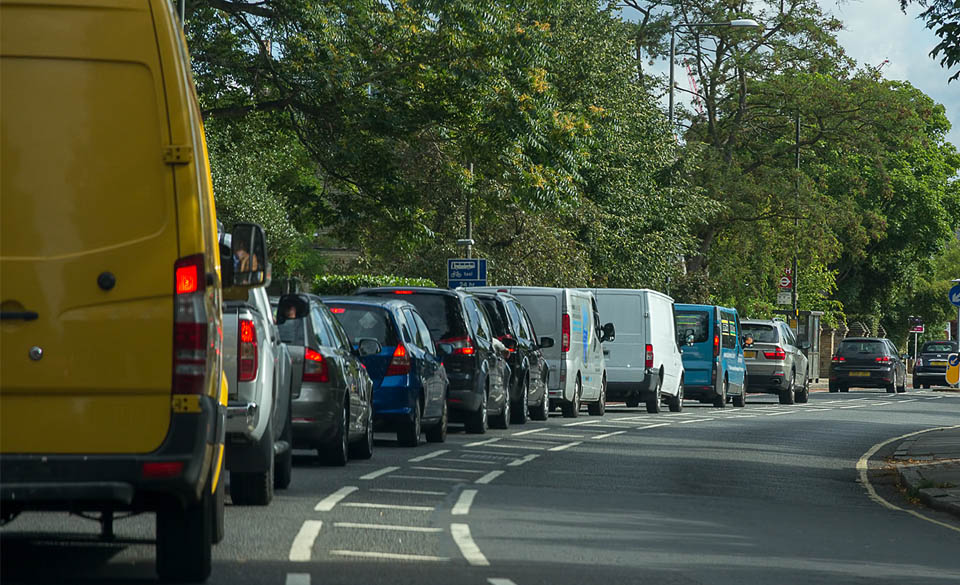Have you ever been stuck in a traffic jam that seems never ending? If so, spare a thought for the motorists who have to use Britain's busiest roads every day for the school run or commute - losing thousands of hours while they sit in a slow-moving queue.
Research into the UK's busiest roads reveals London is the worst region in Britain for wasted hours. In terms of working time spent in traffic jams each year in the capital, each driver loses the equivalent of £1,377!

© MagicBones / Shutterstock
London is followed by Bristol in second place and Manchester third, with motorists losing £805 and £742 respectively each year as they sit in traffic jams, according to studies by traffic data experts at Inrix.
If you want to know whether you're in a congested region, read on as we reveal which UK roads are the most snarled up in the country...
1. A219, London
The A219 southbound in London, from the A304 Fulham Road to the A297 Morden Hall Road, is officially Britain's busiest road during the evening rush hour, starting at 5pm. Commuters waste an average of 47 hours per year in traffic jams on this one stretch of road, officially making it the worst in Britain.
2. A45, Birmingham
Outside London, Britain's busiest road is the A45 eastbound, from Bordesley Circus to Henry Road, in Birmingham, where motorists are stuck in traffic for an average of 37 hours per year at peak time, starting at 4pm.
3. A6177, Leeds
The A6177 southbound, from Bolton Road to Great Horton Road, in Leeds, traps motorists in traffic jams for an average of 34 hours a year at rush hour, from 4pm onwards.
4. A902, Edinburgh
Scotland has its own share of traffic jams, with the busiest road north of the border being the A902 westbound, from the A901 Great Junction Street to A90 Hillhouse Road. During evening rush hour, which starts at 4pm, motorists waste an average of 30 hours a year sitting in tailbacks.
5. A4174, Bristol
Bristol's busiest road is the A4174 Bristol Ringroad northbound, from Hicks Gate roundabout to Bromley Heath roundabout. If you commute along this route, you'll spend around 28 hours per year stuck in traffic during evening rush hour, from 5pm onwards.
Busiest cities
While motorists in Bristol and Manchester waste the most hours per year in traffic jams after London, no single road in Manchester is in the top ten busiest in Britain.
However, the northern business hub still retains the dubious honour of being the third-busiest city traffic-wise in the UK. This is based on the combined total hours that motorists spend in the snarled up centre, on various routes.
The traffic issues in Manchester have improved over the past six years. In 2017, the A586 Bury New Road in Manchester was the fifth most congested highway in the UK, outside London. The average motorist spent 33 minutes each day totally stationary in gridlocked traffic.
In order to avoid traffic jams, motorists are advised to listen to a local traffic report before setting off to check for any particular congestion. Leave home a little earlier if necessary and use your sat nav to find an alternative route.
Record numbers of cars
The Office for National Statistics shows record numbers of cars are on the roads today, so it's no surprise we're getting stuck in gridlocks. The latest data from the ONS revealed 33.2 million cars were on Britain's highways at the end of September 2022.
The total number of vehicles in the UK has increased every year since the end of World War II in 1945, except for in 1991 and 2020.
In 1991, the market was described as "sluggish" with a "weak retail demand", for no particular reason. In 2020, people were trapped at home due to the Covid lockdowns and few new vehicles were sold.
However, apart from these two blips, the average trend for car sales over the past 78 years is an annual increase to reach today's record levels. At the start of the 20th century, there were only 8,000 cars in the whole of Britain and horse-drawn carriages were still a popular mode of transport.

